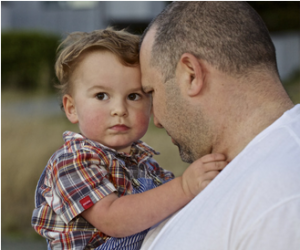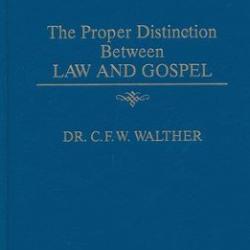
(This will be my last post here for several months. Taking a break for a while.)
+++
In my last post, I spoke about Christian marriage as the real “antidote to chaos”. It is now time to talk about fatherhood as a corollary “antidote” to chaos (and men in general should take note as well).
Are men increasingly irrelevant? Men are only irrelevant if you don’t think we need God.
The most memorable post that I’ve read on the Patheos “Evangelical” blogs comes from the Cranach blog of Gene Edward Veith. It was a piece from several years ago titled: “Raising children so they will go to church as adults”.
As the father of five boys, you might imagine I’d find that post title eye-catching. But what was really captivating was the article’s content.
Gene Veith sums up the matter with this shocking claim:
“Basically, if fathers go to church, their children will when they grow up. If fathers don’t, even if the mothers do, the children won’t.”
On what is such a jarring statement based? Dr. Veith is basing this claim on a 1994 study performed in Switzerland. During the course of the short article, he shares a quote from Touchstone magazine (full article here) which sums up the core content of the study:
“In short, if a father does not go to church, no matter how faithful his wife’s devotions, only one child in 50 will become a regular worshipper. If a father does go regularly, regardless of the practice of the mother, between two-thirds and three-quarters of their children will become churchgoers (regular and irregular). If a father goes but irregularly to church, regardless of his wife’s devotion, between a half and two-thirds of their offspring will find themselves coming to church regularly or occasionally.
A non-practicing mother with a regular father will see a minimum of two-thirds of her children ending up at church. In contrast, a non-practicing father with a regular mother will see two-thirds of his children never darken the church door. If his wife is similarly negligent that figure rises to 80 percent!”
Read the whole thing. That’s what some of my students chose to do recently, when I gave them this as an option for one of their assignments. I found their responses fascinating, and I share some of them with the students’ permissions.
My most skeptical student, and an unbeliever, replied:
“I found the article a little hard to believe and am curious about how the data was gathered. However, that aside, the statistic that surprised me the most actually, was that if both parents attend regularly, 33% of their children will be regular church goers. That seems low for children who attended regularly with both parents while growing up. However, I don’t find it surprising that the father’s attendance at church makes more of an impact on the children than the mom’s attendance. Fathers have a tendency to be more firm in their expectations than moms.”
Chanel said, “it’s not just Switzerland, but my house to”:
“Although these results were from a study in Switzerland, I believe it would have the same data [here]. Children look up to their fathers, which is why it is significantly lower if a father does not go to church. My father barely went to church, but prayed every day. My mom on the other hand had us in church faithfully for bible study and Sunday church. Now, all of my brothers including myself attend church every once in a while, but we still pray every day.”
Another student was not surprised at all:
“Growing up, my mom took me to church, but I really did not understand what was going in the church and whenever I would visit my dad, I did not go to church because he would go to church occasionally. Most children are afraid of their father’s (mostly because men have deep voice’s and strong presence), so when the father speaks, most of the time the children listen. Not to say children do not listen to their mothers, but a man’s voice has more power so to speak. For example, a mother has told a child to clean his or her room, but the child disobeyed the mother by not cleaning the room. The father steps in and raised his voice once, and the child obeyed. The overall message is that the man (the head of the household) were ordained by God to lead everyone in the house. If the head of the household falls everyone in that house falls. It is like a chicken running around with its head cut off. It is the same with God. When believers do not have God as the central focus of their lives, everything falls apart. Without fathers in the home, it falls apart. Without God we are nothing.”

Yet another student noted their initial surprise, but went on to indicate it wasn’t so surprising:
“…it is interesting to see data to support that practicing fathers yield more practicing children. I would not have guessed as much disparity in the numbers. I wonder how much of it has to do with mother’s typically being the primary caregivers and fathers being more the ‘illusive influencer’? Personally, raising 2 kids without their biological father, no matter what I did or didn’t do – their dad, no matter what, walked on water. Now that they are older, this is not so much the case but when they were young, I can surly see had he been practicing, my children would willingly followed suit. Had I been the one to initiate attending it wouldn’t have been nearly as cool as if their dad was. It’s not fair but I can actually see how it may be true.”
The article made Jacob wistful:
“I found the article about parents influence on children’s church-going extremely interesting. My Mother went to church every Sunday, and my Father went to church on Holidays or once a month. I haven’t gone to church since Easter and my sister is not a churchgoer herself. I wished that we could go to church as a family growing up.”
Felicia added this twist:
“… I know my children love me, but it seems that they cling to whatever my husband says. My husband is for sure the religious leader in our family. He leads the children in devotions every night. I’ve been told that the man should be the spiritual leader in the household. My husband grew up where his father did not go to church. My husband didn’t go to church much as a child because of this. What changed my husband was having children. He wanted to be more of a spiritual leader than his father was. So I guess my husband is kind of the exception. In a way, his father’s absence of going to church made my husband want to go even more as he was older. My father in-law adores the children. This made him start going to church. Now he goes every week and is even a church member and passes the offering plate each Sunday. It’s crazy how things work out.”
Brian made a very practical point, speaking on behalf of young boys everywhere:
“…As someone who has taken way to many stats classes I would like to see the data, however, it still brings up an interesting question about the effects of the parents going to church has on kids. This survey was done in 1994 and I wonder if that has anything to do with the fathers usually being the head of the household at that time. I can say that I can’t dispute the idea though since when I was a kid I always went with my Grandma while my Grandpa always had an excuse not to go. I remember dwelling on how come Grandpa didn’t have to go when I did.”

And this, coming from him after the assignment that required attending a worship service, made my heart very happy:
“Well, I have decided that I am going to give [attending church] another chance. There are two main factors that have lead me to this decision and the both came from me taking this class. First, by attending a church to write the paper I came to the realization that my wife and kids were also being affected by my hardheadedness about going to church. My family fell in love with where we went, and my oldest boy specifically keeps asking when he gets to go again. Second, the article you posted about fathers going to church having a correlation with their kids attending. This really spoke to me since, my kids deserve to see what church has to offer, like I did when I was younger, before they decide about their faith. So, in summary, I recognized that even though, in my mind, I have a legitimate reason not to attend. I need to but that aside for my family’s spiritual health.”
How about that? Amen, right?
I’ll give Dr. Veith the final word:
“It may be that the Lord has made it easy for fathers to carry out their calling to bring their children up in the instruction of the Lord (Ephesians 6:4). All you’ve got to do, dads, is take your kids to church. Can you do that?”
You can.
FIN
Image: https://pixabay.com/en/father-son-dad-boy-kid-love-male-2457347/ free for commercial use.












